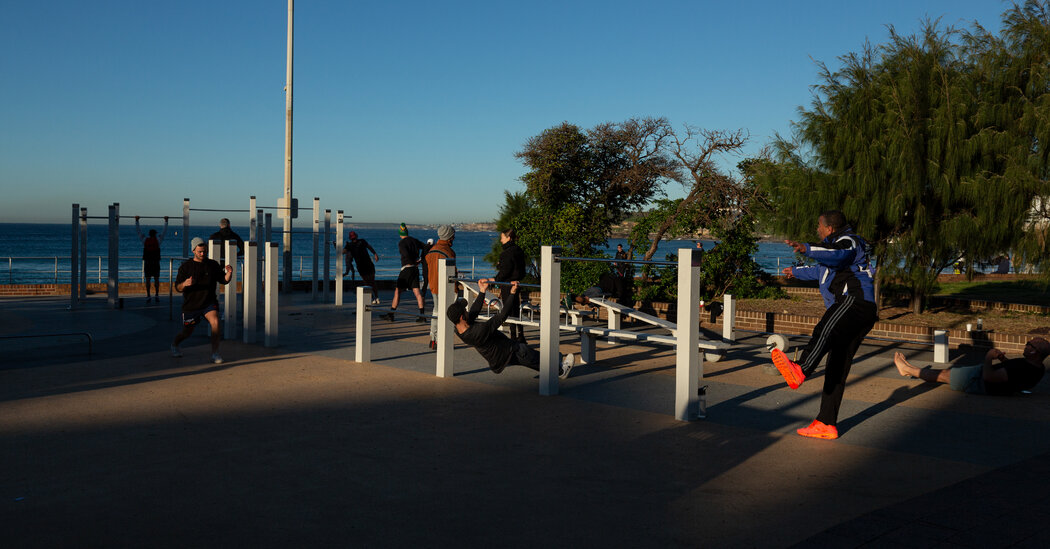The Australia Letter is a weekly newsletter from our Australia bureau. Sign up to get it by email.
As a Melbourne transplant from Sydney, I never used to care much about state-based identities beyond occasionally reveling in the chaos of the potato cake versus potato scallop debate. It’s only since the pandemic that I started to really feel like a Melburnian.
It seems that we’ve all started to define ourselves according to what state we live in over the last 18 months. It’s not hard to see why, with so much of our pandemic response having been along state lines.
We wake up each morning and check our state’s infection numbers, then compare them against the other states’. We’ve created cults of personality around our respective state premiers, the most visible faces of the pandemic response. We watch them argue about vaccine allocation like it’s a zero-sum game, like giving more to another state battling a significant outbreak will mean we are less protected regardless of the case numbers in our community.
In Melbourne, a lot of it has also been due to the shared experience of our long lockdown last year — the prevailing sense that it was Victoria versus the rest of Australia, and the feeling that those in other states didn’t really get what we’d been through.
I’ve noticed this state-based parochialism flare up again recently, as many in Melbourne seem to be watching the lockdown in Sydney with horror, but also with some degree of schadenfreude.
Comments, mostly online but also from friends and people on the streets, run along the lines of: “So much for Sydney exceptionalism.” “If this was Melbourne, we’d have been in lockdown weeks ago.” And even yesterday morning, with the announcement that residents in eight Sydney LGAs are now limited to a five- kilometer radius and required to wear masks outdoors: “Wait, you weren’t doing that already? We’ve been doing that on and off for a year.”
I’m not immune to it either. On the phone with a Sydney friend last week, I couldn’t help thinking, uncharitably: You guys aren’t even in a real lockdown.
Sydneysiders, in turn, have made it clear that this kind of commentary from other states is unhelpful, especially when it often feels like it’s aimed at ordinary people who have no control over creating restrictions and are just trying to survive an all-around terrible situation.
According to the Melbourne-based psychologist Chris Cheers, the increasing animosity between people in different states is a natural outcome of wanting to feel safe in an inherently unsafe, uncertain situation.
“Right now, in Victoria, you’re going to feel safer if you feel connected to Victoria,” he said. “You’re not going to feel as safe if you feel connected to Australia.” Australia, after all, also includes Sydney and its growing virus outbreak.
But he — and many others — worry about the increasing division between states, and how much work might be required for us to go back to feeling like Australians again.
To try to counter some of that animosity, Cheers made social media posts offering Sydneysiders advice for surviving lockdown from someone who’d done it before.
His tips included “Know that whatever you are feeling is a normal reaction to an abnormal situation,” “Bubble baths are lovely, but self-care also means setting boundaries, saying no and asking for what you need,” and “Sometimes, the only thing you can do is anchor yourself and wait for the storm to pass. As all storms do.”
The posts went viral, with many seeing them as a welcome antidote to the vitriol common in online spaces. Other Melburnians jumped on board, offering their own tips and advice.
Everyone’s emotions are heightened during times of stress and uncertainty, and people can lash out in anger or defensiveness as a result. It’s normal for Melburnians, especially, to have complicated feelings about what’s happening in Sydney.
But the Sydney outbreak is a threat to the whole of Australia, not just Sydney. Emotional parochialism might feel satisfying, but remembering the interconnectedness of the country and our sense of community may ultimately be more useful.
“I think the more we can get in touch with that,” Cheers said, “the more we can say, ‘Well, how can we all come together and support each other through this?’”
Now for our stories of the week:



